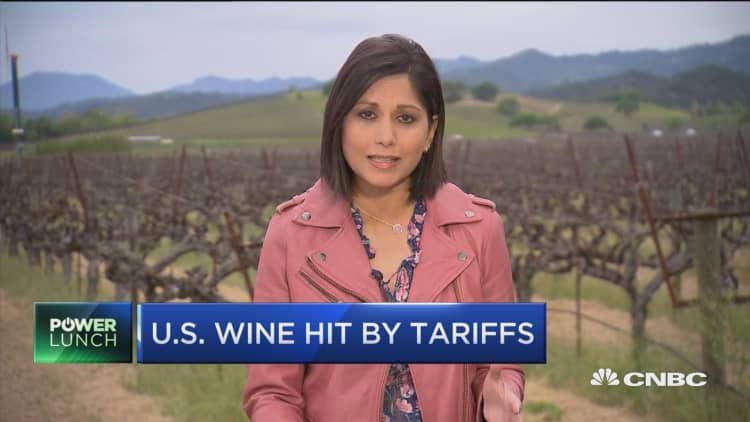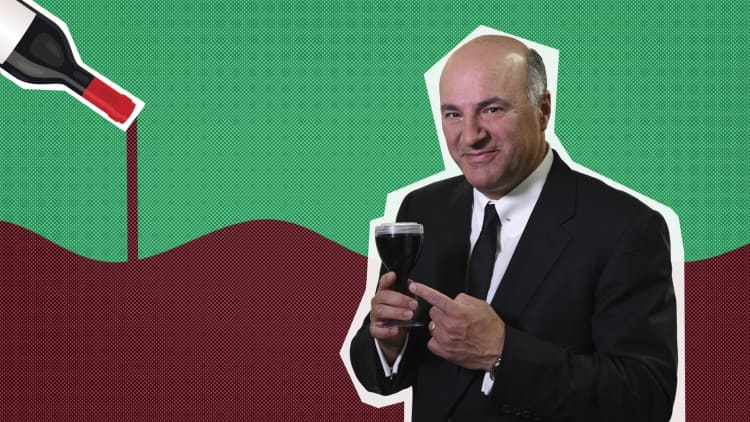The Trump administration said Friday it requested that the World Trade Organization set up a dispute settlement panel to rule on its claim of Canada's "discriminatory" trade practices involving U.S. wine.
The dispute with Canada relates to policies at the provincial level that limit grocery store access to American wines. The marketplace for alcohol in several big Canadian provinces is controlled by government-run enterprises and liquor control boards, and in some cases they own and operate state-run retail networks.
Friday's action specifically relates to the province of British Columbia, where liquor authorities in 2015 amended rules to allow regular grocery stores to start selling wine and liquor but in doing so separated U.S. and other imported wine from B.C.-only product. Even so, American wine industry executives say the U.S. industry continues to have market access issues in other Canadian provinces, including Ontario and Quebec.

Last year, the U.S. held consultations with Canada on the wine issue, but those talks failed to resolve the matter. The request for establishment of a WTO dispute panel is the next step in the settlement process.
The trade action was jointly announced by U.S. Trade Representative Robert E. Lighthizer and Agriculture Secretary Sonny Perdue, who requested that the WTO set up a dispute settlement panel to look at "unfair regulations" that govern the sale of wine in grocery stores in B.C.
According to the announcement, B.C.'s policy of excluding imported wine from grocery store shelves gives "substantial competitive advantage" to B.C. wine. "These regulations appear to breach Canada's WTO commitments and have adversely affected U.S. wine producers."
Canada is the largest single country market for U.S. wine, according to the Wine Institute, a trade organization representing more than 1,000 wineries and related businesses in California. California-produced wine is the No. 1 table wine category in B.C., and the retail value of U.S. wine sales to all of Canada last year was almost $1.1 billion.
"Wine Institute greatly appreciates the Trade Representative's continued efforts to end these discriminatory practices and hold Canada accountable for their WTO obligations," said Robert Koch, president and CEO of the Wine Institute. "Canadian consumers should have the same access to the vast array of the world's great wines."
Koch said his organization will continue to push "for equal treatment of imported and domestic wine by all Canadian provinces. Policies supporting B.C., Ontario and Quebec that provide favorable distribution and retail access, discounted excise taxes, and local bottling requirements for the benefit of domestic producers are contrary to Canada's commitments to the WTO."
The 2015 regulations adopted in B.C. allowed grocery stores in the province a so-called "wine on shelf" option to sell wine anywhere within the store but only BC-produced wine on grocery store shelves. Also, U.S. and other imported wine was only allowed to be sold in B.C. grocery stores where there was a separate so-called "store within a store" option.
"The B.C. policies would allow for imported wine to be in grocery stores within these completely separate ['store within a store'] stores," said Charles Jefferson, vice president of federal and international public policy for the Wine Institute. "But today I'm not aware of any grocery stores that have actually set up those kinds of arrangements."
Yet, Jefferson said it's "very hard to speculate" about the financial impact of the B.C. regulations on U.S. wine producers. "It's really hard to see what the potential impacts are other than we know we're being excluded from those consumers who are in the grocery store," he said.
U.S. wine has an estimated 10 percent share of the B.C. marketplace.
"The practice of discriminating against U.S. wine is unfair and cannot be tolerated any longer," Perdue said in a statement. "Our wine producers rely on export markets and they deserve fair treatment, especially by our northern neighbors in British Columbia."
Lighthizer stated, "Discriminatory regulations implemented by British Columbia are unfairly keeping U.S. wine off of grocery store shelves, and that is unacceptable. Canada and all Canadian provinces, including B.C., must play by the rules. The Trump administration will continue to hold our trading partners accountable by vigorously enforcing U.S. rights under our trade agreements and by promoting fair and reciprocal trade through all available tools, including the WTO."
WATCH: Kevin O'Leary on how to pick a great bottle of wine for under $20



